'The Summer I Turned Pretty' Introduces a New Generation to a Summertime Staple
The Summer I Turned Pretty series adapts the beloved trilogy into a bingeworthy TV show and introduces a new generation to Belly, Conrad, and Jeremiah.


The documentary Lucy and Desi opens up with footage of Lucy herself, paired with a tape of Lucy’s familiar husky voice as she explains how she “admires cats for their self-sufficiency” and thanks Desi for “my two beautiful, healthy children, and my freedom.” It is revealed by Lucy and Desi’s daughter, Lucie Arnaz, that there are many tapes like this one, all containing key insights into the lives and minds of her parents, and all underlining one obvious truth about their partnership: unconditional love.
The film continues on, intercutting old footage from the show with voice-overs and interviews by those personally touched by Lucy and Desi. What makes this documentary so interesting are the audiotapes, provided by their daughter, which offers us a window into the secret world of Hollywood’s most famous couple.
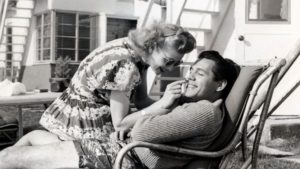
I’m going to be honest: I’m not an “I Love Lucy” fan (insert shocked gasp here). I just never got the appeal. Growing up, re-runs of the show (a very practice invented by Desi and Lucy) would air, and as I flipped from station to station, sometimes I would land on “I Love Lucy”. My family never watched the show, so I didn’t know much about it. But that didn’t keep me from picking up on its importance; people around me ubiquitously seemed to love the show and knew every episode. Television today—from Nickelodeon’s “Drake and Josh” to “That 70’s Show” (and now “Wandavision”)—have referenced “I Love Lucy”. So, why does this show from the 1950’s have such a hold on us as a society?
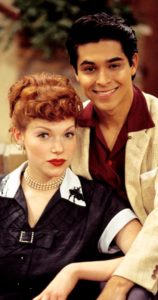
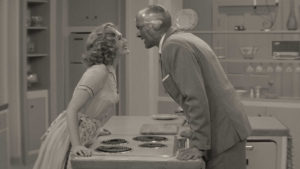
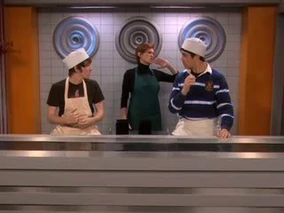
The answer, of course, is that there was really nothing like it at the time. “I Love Lucy” was groundbreaking. Its historical significance has long been known, but ultimately lost on me, I must admit. I think it was the slapstick style of humor I could never get behind. I found it…a bit infantilizing to say the least. Lucy was childlike—and Desi acted more like her stern father than her husband. But before I go on a Freudian tangent, I need to give credit where credit is due. Because the truth is, I was mostly ignorant about why “I Love Lucy” was so special. Lucy and Desi allows for a unique view into what makes this couple so exceptional and illuminates the show’s significance to a modern audience.
*Spoilers ahead*
Right away, we are introduced to a woman who seems to know no fear. From her comedic style to her confident personality, Lucille Ball “always did her own thing” according to her younger brother, Fred Ball. From him we learn about Lucy’s upbringing: raised by a kindhearted grandfather with a love of Vaudeville shows and an authoritative and strong-willed mother, Lucy gained an appetite for life and a desire to shine. She was unapologetic in who she was, determined to make a life for herself, and willing to do what no one else wanted to do.
Her fearlessness in her comedic approach made her an outlier at a time when Donna Reed and June Cleaver were the picturesque examples of femininity. “She wasn’t afraid to look ugly,” according to fellow comedian Bette Midler. At the time, that style of physical comedy was almost exclusively reserved for male comedians like Charlie Chaplin. Lucille Ball circumvented gender roles and challenged the notion that women couldn’t be funny—something that no doubt resonated with director, Amy Poehler (yes, that Amy Poehler).

Lucy introduced to the world a new kind of female character—one that not only had a personality and her own ambitions but was herself the main character. The success of “I Love Lucy” paved the way for new portrayals of femininity and female relationships. For once, women “[speaking on Ethel’s and Lucy’s relationship] …got to be teammates. They weren’t pitted against each other…they got to conspire, commiserate,” as Executive Director of the National Comedy Center, Journey Gunderson, points out in an interview for the documentary. Although, based on the reception to Lucy’s later project, “Here’s Lucy”, featuring Lucy and Ethel as divorced, single women raising their kids together, the country still had a long, long, way to go. But Lucy’s vision was ahead of her time, and the support of her husband, Desi, made that vision possible, demonstrating to men everywhere that women and men could be equal partners in life and in marriage.
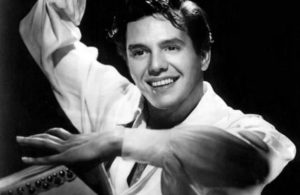
Desi’s story is a familiar one. He came to America with nothing. He didn’t speak the language; he wasn’t sure how he would fit in as a Cuban refugee during a time when paranoia surrounding Communism was at an all-time high. But Desi was resourceful and willing to do whatever it took to create a life for himself and his family. He took odd jobs until he started a rhumba band and gained fame playing nightclubs, introducing the American public to the rhythm and sound of Latin music. When Desi later met and married Lucy, they fearlessly decided to introduce an overwhelmingly white American audience to an unapologetically “interracial” couple, determined to prove to studio execs that America would not only find Ricky and Lucy believable as a married couple, but would come to love them as well. And love them people did.
Through the show, Desi was able to “bring a sophistication” to Latino men at a time when “they weren’t known for it,” according to Cuban playwright, Eduardo Machado upon reflecting on Desi’s influence. Desi’s “straight man” to Lucy’s playful exuberance subverted people’s expectations of what a Latino man could be and added respect and nuance to the way onscreen marriages between men and women were portrayed. Desi didn’t have to play the domineering, chauvinistic character in order for their marriage to be believable; he was Lucy’s husband and equal, demonstrating to America a new kind of role for men to play in marriage.
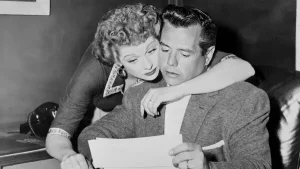
Desi and Lucy didn’t just play equals onscreen—they lived it too. Lucy was the creative genius behind the show and its star. As VP of Desilu Productions, the production company she and Desi founded and co-owned, Lucy was an equal partner in the business, later taking over as President when Desi stepped down. Even though Desi at times found it hard to live in the shadow of his wife’s fame, he never wavered in his support of Lucy’s dreams and freedom as a creator, as a woman, and as his wife. He stood by her side all his life, even after they divorced, never failing to credit her as the reason behind the show’s success.
Desi Arnaz is an example to men everywhere and shows us what is possible when men support the women in their lives and treat them as equals in a relationship—whether it be romantic, platonic, or business.
Ultimately, Lucy and Desi is a story about two people who loved each other. The success of their show and its legacy is really a testament to that mutual love and respect. “I Love Lucy” was able to bravely forge ahead and set so many precedents because Desi and Lucy were a true team, sharing one another’s vision. Their continual encouragement of each other allowed both of them to achieve fulfillment and happiness in their lives. Lucille Ball, whether she intended to or not, carved out a path for female comedians and actors to rise to fame. She inspired and encouraged new talent, guiding younger women, such as Carol Burnett and Bette Midler, cheering for them to succeed.
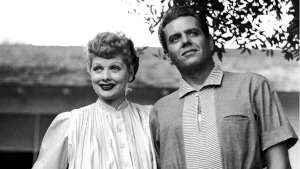
In Desi, Lucy had a genuine partner she could trust, rely on, and respect. Lucy and Desi does a beautiful job of highlighting both the historical and cultural impact of “I Love Lucy” while also painting a poignant picture of a real-life couple. Whether you are a diehard “I Love Lucy” fan or coming into this completely green, I highly recommend watching this 2022 triumph from Amy Poehler.
Related lists created by the same author
The Summer I Turned Pretty series adapts the beloved trilogy into a bingeworthy TV show and introduces a new generation to Belly, Conrad, and Jeremiah.
Related diversity category
The animated musical adventure beings fantasy and magic to viewers as they follow Keegan and Moya.
Related Movie / TV / List / Topic
In Tall Girl, Jodi learns to stand tall and find confidence within.